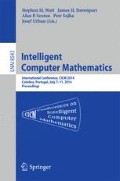Abstract
This paper describes Hipster, a system integrating theory exploration with the proof assistant Isabelle/HOL. Theory exploration is a technique for automatically discovering new interesting lemmas in a given theory development. Hipster can be used in two main modes. The first is exploratory mode, used for automatically generating basic lemmas about a given set of datatypes and functions in a new theory development. The second is proof mode, used in a particular proof attempt, trying to discover the missing lemmas which would allow the current goal to be proved. Hipster’s proof mode complements and boosts existing proof automation techniques that rely on automatically selecting existing lemmas, by inventing new lemmas that need induction to be proved. We show example uses of both modes.
Access this chapter
Tax calculation will be finalised at checkout
Purchases are for personal use only
Preview
Unable to display preview. Download preview PDF.
References
Blanchette, J.C.: Personal communication (2013)
Buchberger, B.: Theory exploration with Theorema. Analele Universitatii Din Timisoara, ser. Matematica-Informatica 38(2), 9–32 (2000)
Buchberger, B., Creciun, A., Jebelean, T., Kovacs, L., Kutsia, T., Nakagawa, K., Piroi, F., Popov, N., Robu, J., Rosenkranz, M., Windsteiger, W.: Theorema: Towards computer-aided mathematical theory exploration. Journal of Applied Logic 4(4), 470–504 (2006), Towards Computer Aided Mathematics
Claessen, K., Hughes, J.: QuickCheck: a lightweight tool for random testing of Haskell programs. In: Proceedings of ICFP, pp. 268–279 (2000)
Claessen, K., Johansson, M., Rosén, D., Smallbone, N.: Automating inductive proofs using theory exploration. In: Bonacina, M.P. (ed.) CADE 2013. LNCS, vol. 7898, pp. 392–406. Springer, Heidelberg (2013)
Claessen, K., Smallbone, N., Hughes, J.: QuickSpec: Guessing formal specifications using testing. In: Fraser, G., Gargantini, A. (eds.) TAP 2010. LNCS, vol. 6143, pp. 6–21. Springer, Heidelberg (2010)
Dixon, L., Fleuriot, J.D.: Higher order rippling in IsaPlanner. In: Slind, K., Bunker, A., Gopalakrishnan, G.C. (eds.) TPHOLs 2004. LNCS, vol. 3223, pp. 83–98. Springer, Heidelberg (2004)
Haftmann, F., Bulwahn, L.: Code generation from Isabelle/HOL theories (2013), http://isabelle.in.tum.de/doc/codegen.pdf
Haftmann, F., Nipkow, T.: Code generation via higher-order rewrite systems. In: Blume, M., Kobayashi, N., Vidal, G. (eds.) FLOPS 2010. LNCS, vol. 6009, pp. 103–117. Springer, Heidelberg (2010)
Heras, J., Komendantskaya, E., Johansson, M., Maclean, E.: Proof-pattern recognition and lemma discovery in ACL2. In: McMillan, K., Middeldorp, A., Voronkov, A. (eds.) LPAR-19. LNCS, vol. 8312, pp. 389–406. Springer, Heidelberg (2013)
Hurd, J.: First-order proof tactics in higher-order logic theorem provers. In: Design and Application of Strategies/Tactics in Higher Order Logics (STRATA), number NASA/CP-2003-212448 in NASA Technical Reports, pp. 56–68 (2003)
Ireland, A., Bundy, A.: Productive use of failure in inductive proof. Journal of Automated Reasoning 16, 79–111 (1996)
Johansson, M., Dixon, L., Bundy, A.: Conjecture synthesis for inductive theories. Journal of Automated Reasoning 47(3), 251–289 (2011)
Kühlwein, D., Blanchette, J.C., Kaliszyk, C., Urban, J.: MaSh: Machine learning for Sledgehammer. In: Blazy, S., Paulin-Mohring, C., Pichardie, D. (eds.) ITP 2013. LNCS, vol. 7998, pp. 35–50. Springer, Heidelberg (2013)
McCasland, R.L., Bundy, A., Smith, P.F.: Ascertaining mathematical theorems. Electronic Notes in Theoretical Computer Science 151(1), 21–38 (2006)
Montano-Rivas, O., McCasland, R., Dixon, L., Bundy, A.: Scheme-based theorem discovery and concept invention. Expert Systems with Applications 39(2), 1637–1646 (2012)
Nipkow, T., Paulson, L.C., Wenzel, M.T.: Isabelle/HOL. LNCS, vol. 2283. Springer, Heidelberg (2002)
Paulson, L.C., Blanchette, J.C.: Three years of experience with Sledgehammer, a practical link between automatic and interactive theorem provers. In: IWIL 2010 (2010)
Author information
Authors and Affiliations
Editor information
Editors and Affiliations
Rights and permissions
Copyright information
© 2014 Springer International Publishing Switzerland
About this paper
Cite this paper
Johansson, M., Rosén, D., Smallbone, N., Claessen, K. (2014). Hipster: Integrating Theory Exploration in a Proof Assistant. In: Watt, S.M., Davenport, J.H., Sexton, A.P., Sojka, P., Urban, J. (eds) Intelligent Computer Mathematics. CICM 2014. Lecture Notes in Computer Science(), vol 8543. Springer, Cham. https://doi.org/10.1007/978-3-319-08434-3_9
Download citation
DOI: https://doi.org/10.1007/978-3-319-08434-3_9
Publisher Name: Springer, Cham
Print ISBN: 978-3-319-08433-6
Online ISBN: 978-3-319-08434-3
eBook Packages: Computer ScienceComputer Science (R0)

